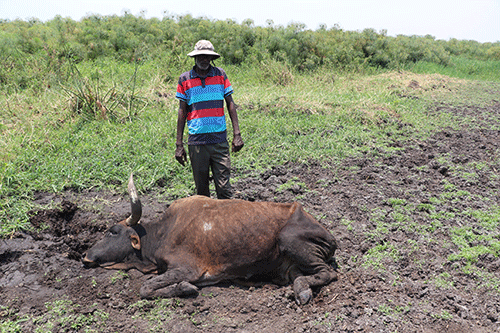IKABA – The flood plains of Ikaba in the Kabbe South constituency are always evergreen, and many farmers thus choose to farm there because of the vast grazing land for their livestock.
The area is prone to seasonal floods, but whenever the water subsides, farmers
would take their cattle back to the lower land where apart from green pastures, there is plenty of water for their animals.
However, when farmers took their cattle back to the lower land this year, no one anticipated the disaster which awaited their livestock. As early as July, farmers noticed that their animals – particularly the lactating and pregnant cows – started dying one by one.
By mid-August, the situation worsened, and most farmers in the flood plains started losing animals in large numbers. The major and early symptoms included weakening, diarrhoea and failing to stand, which led
to death within two or three days.
During a visit to Ikaba, a bad smell emanated from the rotting carcasses scattered all over the plains.
“The loss of our cattle has left us scared and hopeless. Starting from June-July to date, we have lost our bulls; cows which are pregnant and about to deliver, die; and heifers are also dying. It is a great loss,” said Betty Namata, a farmer in the Ikaba area.
Farmer Muyoba Mubita said they have no idea why their cattle are dying.
“We are worried. As you can see, we have green pastures. But we are troubled why our cattle are dying. We request the minister of agriculture to come and see our losses. If we walk around, there are just carcasses all over,” he added.
Showing one of the bulls which was about to die was farmer Rodrick Silishebo, who said they are financially strained because of the dying animals which they cannot sell.
“This one is about to die. If I were to sell it, as you can see how big it is, I could get almost N$8 000. From that amount, I could buy my children food, school uniforms, and stationery. But now, I will not get anything I will walk away empty-handed,” he lamented.
Farmers reportedly engaged the regional veterinary office for assistance in diagnosing what they deemed as a mysterious illness. However, they complained that veterinary officials were reluctant to respond, and allegedly viewed the issue as not serious.
This prompted farmers to engage private vets while others took samples, which they handed over to the regional veterinary offices. It was at this stage that the mysterious illness was diagnosed as Pasteurella.
In a response to the questions sent to the agriculture ministry, deputy director: public relations Chrispin Matongela confirmed that they had received several reports of animals dying in the region. He added that samples were taken, and Haemorrhagic Septicaemia (HS) and heartwater disease were confirmed.
“HS is caused by Pasteurella multocida, an opportunistic bacterium of the upper airways, which then descends to the lungs and causes infection. This disease is infectious, with a high mortality rate if unattended”, he stated.
Matongela said affected farmers were advised to immediately vaccinate all their healthy cattle against pasteurella, black quarter, botulism and anthrax, which are common during the dry season.
However, farmers at Ikaba say they have never seen veterinary officials in their area to assess the situation. Additionally, they took the advice to vaccinate their animals, but to no avail.
“We vaccinated our animals against Pasteurella.
Another thing which is worrisome is that we heard they used a vaccine that is new, which they have never used before. That’s the one for food and mouth disease (FMD). We want them to confirm it to us. Why is it that our area here is a ground for trials? This where they come to try new medicines,” stated visibly agitated farmer Kakambi Mbeha.
This reporter understands that the agriculture ministry has thus far dispatched a fact-finding team to the Zambezi region to investigate further if other diseases are causing the deaths, and whether there is a need to vaccinate.
*Aron Mushaukwa is an information officer for the MICT in the Zambezi region.



